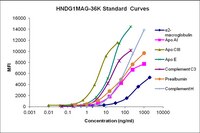Cerebrospinal fluid complement activation in patients with pneumococcal and meningococcal meningitis.
Mook-Kanamori, BB; Brouwer, MC; Geldhoff, M; Ende, Av; van de Beek, D
The Journal of infection
68
542-7
2014
Show Abstract
Recent research into the treatment of bacterial meningitis has examined the innate immune system, specifically the complement system, as a potential target for adjuvant therapy. However, the effects of blocking the complement system may be pathogen dependent.We measured cerebrospinal fluid (CSF) levels of complement components C1q, C3a, iC3b, C5a, sC5b-9, CFH and MBL in 310 patients with pneumococcal and meningococcal meningitis from a prospective nationwide cohort study. The CSF complement component levels were successfully determined for between 289 (93%) and 307 (99%) patients, depending on available volumes of stored CSF.Complement factors C1q and MBL as well as common complement pathway factors C3a, iC3b, C5a, sC5b-9 and complement regulator CFH were all elevated in patients with bacterial meningitis as compared to the controls. CSF levels of complement components C5a and sC5b-9 were higher in patients with pneumococcal meningitis compared to those with meningococcal meningitis. After correction for age, immunocompromised state and level of consciousness, the CSF concentrations of C5a and sC5b-9 remained different between causative microorganisms (P = 0.006 and P = 0.016 respectively). In pneumococcal meningitis high C5a and C5b-9 levels are associated with the occurrence of systemic complications, unfavorable outcome and death, whereas an inverse relationship between C5b-9 levels and mortality is observed in meningococcal meningitis.Our study shows striking variations in complement activation depending on the pathogen responsible for the bacterial meningitis. In pneumococcal meningitis, high CSF complement levels were a strong indicator of disease severity and mortality, however in meningococcal meningitis, an inverse relationship between sC5b-9 and mortality was observed. | 24412248
 |
Plasma proteins predict conversion to dementia from prodromal disease.
Hye A, Riddoch-Contreras J, Baird AL, Ashton NJ, Bazenet C, Leung R, Westman E, Simmons A, Dobson R, Sattlecker M, Lupton M, Lunnon K, Keohane A, Ward M, Pike I, Zucht HD, Pepin D, Zheng W, Tunnicliffe A, Richardson J, Gauthier S, Soininen H, K³oszewska I, Mecocci P, Tsolaki M, Vellas B, Lovestone S.
Alzheimers Dement. 2014 Nov;10(6):799- 807.e2
2014
| 25012867
 |











